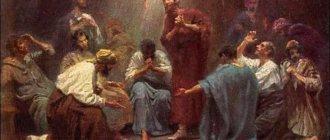“Are you going to be anointed?” — this question can often be heard from parishioners of our churches. Moreover, one is supposed to go specifically to the anointing, and not to a divine service dedicated to this or that saint or holiday. But what is hidden behind this action so beloved by us, is it the most significant during the evening service, and how does myrrh differ from oil, anointing from Confirmation and Blessing of Unction (unction)? The cleric of the Holy Trinity Cathedral in Pokrovsk, priest Alexy Savin, talks about this in a lesson at our church school.
Since ancient times, spruce has been considered a healing substance. Since Old Testament times, it has signified grace, joy, and revival. In the Book of Leviticus it is mentioned as a means to cleanse lepers. The apostles also used anointing with oil for the sick, as we read from the Evangelist Mark: and they anointed many sick people with oil and healed them (Mark 6:13). Blessed Simeon of Thessaloniki gives the definition: “Oil is holy in the power of sacred rites and is full of divine power, and at the same time, as it anoints sensually, it enlightens and sanctifies souls, strengthens strength, both physical and spiritual, heals wounds, destroys diseases, cleanses us from the impurity of sin and has the power to give us the mercy of God and to propitiate Him.” According to the custom of the East, when a person was proclaimed a monarch, the priest poured a cup of oil on his head. Oil, the oil of the olive, was considered a symbol of strength. The rite of “anointing” reminded that power is granted from God, whose Spirit will henceforth dwell on the Chosen One. Therefore, each ruler of Israel (and sometimes a prophet) was called the Anointed One, the Messiah, or in Greek - Christ. However, over time, this title began to be attributed only to the great King of the future.
What is anointing?
Anointing with consecrated oil is a rite performed during Orthodox worship and outside it. The following types should be distinguished:
• Anointing
at the all-night vigil. The priest anoints the faithful with oil from a lamp burning on the central candlestick in the temple in front of the icon of the holiday. Thus, the oil with which the anointing is performed is consecrated in honor of the saint or event being celebrated. When anointing with oil at the all-night vigil, ordinary lamp oil or specially selected oil of a higher quality can be used. Olive oil, to which a little oil from the lamp has been added, is well suited for this purpose. This option is preferable, especially if you have lamp oil burning in your church that is not of the highest purity: it is important that the anointing does not have a harmful effect on the skin of parishioners, including infants.
• Blessing of Unction
- This is
the Sacrament of Unction
. During its celebration, oil mixed with wine is blessed. Then the worshipers are anointed with this oil 7 times. After the Sacrament is completed, the remaining oil is distributed to the believers, and they are anointed with it at home, and sometimes they take it inside, praying for the healing of soul and body. For Unction, it is highly advisable to use oil suitable for human consumption.
• Anointing with oil
from the lamp in the temple outside of worship and at home. When making pilgrimages, pilgrims bring blessed oil from holy places. Initially, at the request of believers, they were poured a little oil from the lamp. Nowadays, in most churches you can purchase consecrated oil, pre-packaged in small bottles.
• During the Sacrament of Baptism, before dipping the person being baptized into the font, the priest anoints him with consecrated oil, consecrated before this with a special special prayer. This prayer speaks of oil as a symbol of the reconciliation of those entering the Church with God. The priest anoints the chest, ears, hands and feet of the person being baptized, saying: “ The servant of God (name) is anointed with the oil of gladness in the name of the Father, and the Son and the Holy Spirit. Amen ." Chest with the words - “ For the healing of soul and body ”, ears - “ For the hearing of faith ”, hands - “ Thy hands created me and created me ”, legs - “ To walk in the footsteps of the commandments of the Lord .”
Confirmation
The establishment of the Sacrament of Confirmation dates back to apostolic times. In the original Church, each newly baptized person received the blessing and gift of the Holy Spirit through the laying on of hands by an apostle or bishop. Subsequently, with the increase in Christians, due to the impossibility of a personal meeting of each newly baptized person with the bishop, ordination was replaced by Confirmation. In the Orthodox Church, Confirmation is performed by a priest, but the chrism itself (fragrant oil) is prepared by the bishop, and in modern practice, only the head of the autocephalous Church (Patriarch, Metropolitan) has the right to prepare the chrism. In Moscow, for example, the Patriarch of Moscow and All Rus' performs the rite of making chrism once a year and then distributes the consecrated chrism to parishes, thus everyone who becomes a member of the Church receives the blessing of the Patriarch. The Sacrament of Confirmation, like Baptism, is performed on a person only once in a lifetime. This sacrament is also performed on persons joining the Church from heretical societies. In the Sacrament of Confirmation, Divine grace is given for our spiritual growth, which introduces a person to the life of the Church and makes it possible for him to participate in other sacraments.
Anointing oil in church shops
In church shops you can buy consecrated anointing oil from various saints. It can be brought from holy places - for example, from the Holy Sepulcher, from Diveevo, etc. or manufactured in production and consecrated by an invited priest. As a rule, this oil should not be eaten. It is poured into small, usually plastic, vials, on the labels of which there is a picture of a saint or an icon, the prayer to which the oil is consecrated and a signature, for example: oil from the blessed. Matrons, consecrated oil from the icon of the Mother of God “The All-Tsarina”, etc. When the oil runs out, the bottle or at least the label with the icon should be burned.
What does the New Testament say about anointing with oil?
We find fewer references to oil in the Gospels and Epistles than in the Old Testament.
The first mention is in Matthew 25, but it does not refer to the anointing with oil, nor to the disease, but only to the oil for the lamps of the ten virgins. The first mention in which we see someone anointed with oil is in:
- Mark 6:13
This passage tells an incident when Jesus sent out His disciples two by two and gave them authority over unclean spirits. In verses 12 and 13 the Scripture reads as follows:
They went and preached repentance; They cast out many demons and anointed many sick people with oil and healed them . (Mark 6:12,13)
In the context of healing many sick people, the disciples used oil.
- Luke 10:25-27 – The Parable of the Good Samaritan
This passage gives an example of a Samaritan man who was passing along the road and saw a beaten and bleeding man lying on the ground. The Samaritan took pity on the man and:
AND
approached and
bandaged his wounds, pouring oil and wine ; and, setting him on his donkey, brought him to the inn and took care of him; (Luke 10:34)
This passage makes it very clear for what purpose the oil was used, namely to dress the wound of the patient. We also understand that at that time oil and wine were used as medicines. It is interesting that in the book of Isaiah and in the Gospel of Luke, oil is used to dress wounds. The disciples, in Mark 6:13, used oil to heal many sick people during the same period in history that the parable of the Good Samaritan was told.
There is another reference to anointing with oil in the New Testament, namely when the Lord Jesus was in the house of Simon the Pharisee.
- Gospel of Luke 7:44-46
A sinful woman came there and anointed the feet of the Lord Jesus with ointment. When Simon began to grumble within himself, the Lord Jesus said:
And turning to the woman, he said to Simon: Do you see this woman? I came to your house, and you did not give me water for my feet, but she wet my feet with her tears and wiped them with the hair of her head; You did not give Me a kiss, but she, since I came, has not stopped kissing My feet; You didn’t anoint My head with oil , but she anointed My feet with myrrh. (Luke 7:44-46)
As you can see, the rebuke of the Lord Jesus has nothing to do with healing or illness.
How to anoint yourself with blessed oil
You can anoint yourself with holy oil at any time, if you wish, excluding the days of women's periods. During anointing, they usually pray to the one in whose honor the oil is consecrated. Prayer during anointing with cathedral oil is also common.
:
“In the name of the Father, and the Son, and the Holy Spirit (they anoint the forehead with a cross). Lord, with the prayers (of the Mother of God or such and such a saint), remove my passions (anoint the chest or neck), sanctify my deeds (anoint the hands), heal illnesses (anoint the sore spot).”
.
Anointing in the Church
Anointing in church during an Orthodox service is called anointing. This church rite consists of the priest applying oil (blessed oil) in a cross shape to the forehead of the believer. This symbolizes the sending down of the mercy and grace of the Lord on a person.
Anointing at the evening Orthodox service
Since ancient times, blessed oil has been used by the Church in worship and the Sacraments. Oil (translated from Greek as “olive oil”) is a symbol of the grace of the Holy Spirit. In the original Greek of the Gospel parable of the Good Samaritan (Luke 10:25-37), the words “oil” and “mercy” are consonant and have similar spellings. Mercy is a virtue demonstrated by a Samaritan towards his suffering neighbor. The main character of the parable used oil to heal the wounds of the sufferer. Also, oil, along with livestock and crops, was used for sacrifices to God. The traditional burning of oil in a lamp in front of icons also has the nature of a sacrifice. That is, the lamps not only illuminate the faces, but through them believers seem to offer oil as a sacrifice to the Lord.
Symbolism and history
Oil, oil is a symbol of God's mercy and human mercy. In ancient times, natural olive oil was used as a medicine - in particular, it was poured on wounds, and also lubricated with it to soften the skin in the hot southern climate.
The Apostle James writes in his letter: “ If any of you is sick, let him call the elders of the Church, and let them pray over him, anointing him with oil in the name of the Lord. And the prayer of faith will heal the sick” (James 5:14-15).
This is how the sacrament of Unction was established
.
Mentions of miracles of healing
that
occurred during anointing with oil from a lamp burning in front of a revered shrine have been found in Christian texts since ancient times.
What is the significance of anointing with oil in the Old Testament?
Most biblical references to oil are found in the Old Testament. The use of olive oil was widespread in Israel. This oil was used for sacrifices in the temple, for grain offerings, and in filling the priestly censers that were used in the Tabernacle.
Since our topic relates specifically to anointing with oil, in this article we will focus on a few verses that speak broadly about anointing with oil.
- Exodus 30:23-32 – Use of oil for the sacred anointing of the Tabernacle.
In these verses, the olive oil was prepared in a special way. Namely:
Take for yourself the best fragrant substances: pure myrrh five hundred [shekels], fragrant cinnamon half as much as that, two hundred and fifty, fragrant cane two hundred and fifty, cassia five hundred shekels, according to the shekel of the sanctuary, and a of olive oil ; and make from this myrrh for sacred anointing , a compound ointment, by the art of making the ointment: this will be myrrh for sacred anointing . (Ex.30:23-25)
As you can see, the oil from this text was not only pure olive oil, but a mixture of the best fragrant substances. In verse 25, all these fragrant substances together were called “holy anointing ointment.” It was with this oil that the Tabernacle and all the vessels of the Tabernacle were to be anointed. Then, in verse 30, the Lord says the following:
Anoint Aaron and his sons and consecrate them to be priests to Me. (Ex.30:30)
The Lord forbade the people of Israel to produce such oil for any other use. This oil was considered holy and it was not allowed to anoint any person with it except the priests and members of the Tabernacle.
The bodies of other people should not be anointed with it, and in terms of its composition do not make [yourself] like it; it is a shrine: it must be a shrine for you. (Exodus 30:32)
This oil spoken of in this passage has nothing to do with sickness, but with sanctification. It was made in a special way.
- 1 Kings 16:13, 1 Kings 1:39 – Oil is required for the anointing of kings on the throne.
Both David and Solomon were anointed kings with oil.
- Esther 2:12 – Used for cosmetic purposes.
The meaning of anointing with oil for Esther was cosmetic and was not used in the context of illness. Before her first visit to the emperor, for 6 months Esther was anointed with oil and other fragrant substances. All of these elements were used to prepare her so that she would look her best when she appeared before the emperor. Psalm 45:15 also tells us that oil beautifies the face.
- Psalm 44:8 – Prophecy about the Lord Jesus.
You loved righteousness and hated iniquity; therefore , O God, Your God has anointed You with the oil of joy more than Your fellows. (Ps. 44:8)
We find this prophecy about the Lord Jesus confirmed in the New Testament in Hebrews 1:9 and this anointing with oil has nothing to do with healing from illness.
- Isaiah 1:6 - Oil softens wounds
From the sole of his foot to the crown of his head there is no healthy place: ulcers, spots, festering wounds , uncleansed and unbandaged and not softened with oil . (Isa.1:6)
Isaiah describes here the condition and punishment of the people of Israel. He speaks of the oil as a soothing ointment, a medicine that can soothe the festering and unclean wounds of the people of Israel.










